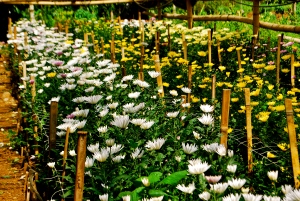 Loading... Please wait...
Loading... Please wait...-
CALL US AT 632-8140854 or 0917-6731947
- My Account
- Items / $0.00
All prices are in All prices are in USD
Categories
Natural Pesticides
Posted by Paula Aberasturi on 5th Feb 2014
I recently wrote about the voluminous use of pesticides in plants and flowers. We also loathe pests and insects. Through the years, we have learned a few tricks to get rid of pests the natural way.
Healthy plants and healthy soil: One of the easiest ways to control pests in the farm is to prevent them from coming in! We have learned that healthy plants have healthy defenses. Just like us, when we are weak, we are more prone to sickness. Weak plants are either already infected, or will attract even more predators. What we do in the farm is pull out or dispose of weak plants. Do note that your most important defense is to have a healthy soil. Healthy soils grow strong and vibrant plants. We keep our soils in tip-top shape by natural composting methods such as mulching and using compost or natural fertilizer to the soil.
Healthy vibrant chrysanthemums
In fact, a new study from Washington State University suggests organic growing techniques offer better pest control and larger plants (published in the respected journal Nature.)
“Organic agriculture promotes more balanced communities of predators,” says David Crowder, author of the new study. [...]“Our study does not tell farmers they should shift to organic agriculture. What our study suggests is that organic agriculture is promoting these more balanced natural enemy communities and they may have better, organic pest control.”
According to Nature: it is “the relative abundance of different species” rather than the number of species present on a farm that may determine success. The study found that the increased evenness of organic farms compared with that of conventional farms led to 18% lower pest densities and 35% larger plants.
Here are some of the ways we get rid of our pests through organic farming, and get larger plants because of it:
Minimize insect habitats: Make sure that you do not have breeding places in your area for insects. In our farm, we regularly clean our greenhouses, making sure they are free from debris and weeds, which are breeding places for insects.
Keep the leaves dry: Insects and fungus thrive on wet leaves. Wet leaves also spread disease. In our farm, we use drip irrigation methods to water our plants. Drip irrigation delivers the water to the plant’s roots without wetting the leaves. How is this done? Tiny holes are inserted at various points in a hose, allowing small quantities of water to trickle slowly into the soil over long periods of time. Another advantage of this method is saving water. Unlike sprinkler systems, we use 30-50% less water, applying these directly to the area where the plants need it the most. Drip irrigation also prevents soil erosion and nutrient run-off.
Take advantage of beneficial insects: There are actually some insects or pests that are good for the farm or your garden. For example, LADYBUGS eat aphids, mites, whiteflies and scale (the worst pests for flowers.) That is why we just love ladybugs and take care of these insects in the farm.
Ladybugs are Welcome!
Make your own homemade pesticide barriers or sprays:
Flypaper: Do you know that ANY heavy paper or cardboard, painted with yellow and coated with anything sticky can be an effective flypaper? In our farm, we use recycled hard plastic containers, paint these yellow and then put sticky substances on them. We just hang these in our greenhouses and catch pesky aphids and whiteflies!
Do-it-yourself Sticky Traps
Neem Extract: We use a lot of Neem in the farm. Neem has remarkable powers for controlling insects. Its extract is used as a safe and natural pesticide. It is so unique because Neem does not immediately kill the insect. Instead, it alters an insect’s behavior or life processes in ways that can be extremely subtle. Eventually, however, the insect can no longer feed or breed or metamorphose, and cannot cause damage. Because of this subtle method, our crops, people, and animals are protected.
Fish Emulsion: We have replaced chemical pesticides with mixes of our fish emulsion. What is it? Fish waste, yes you read it right, foul and messy fish entrails! We gather all fish scraps from the markets, grind them, and mix them with an enzyme. We screen out the bones and decant the oil, and what remains is fish silage. Also, enzymes already in the ground fish continued to digest and break down to amino acids. More than a pesticide, it doubles as a great fertilizer. Fish emulsions are wonderful sources of nutrients!
So there. You can actually rid yourself of those pesky flies and insects without spraying yourself and your pretty flowers with chemical concoctions! All it takes is some creativity while you harness the wisdom of nature.








